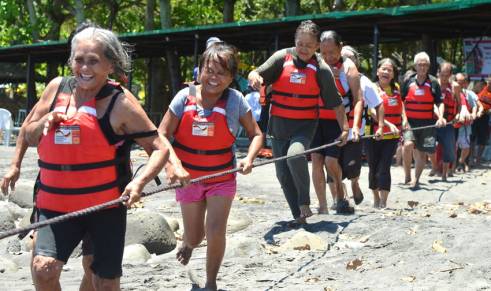By Sarah Marzouk
On 13 October, International Day for Disaster Reduction, HelpAge and the United Nations Office for Disaster Risk Reduction (UNISDR) issued a joint call for greater involvement of older people in disaster management efforts worldwide.
There is strong evidence that older people suffer disproportionately from disasters even in developed countries. In 2005, 75% of those killed by Hurricane Katrina were over 60, even though they made up just 15% of the population in New Orleans.
In 2011, 56% of those who died in the Great East Japan Earthquake and Tsunami were 65 and over, despite comprising just 23% of the population.
Resilience is for life
International Day for Disaster Reduction (IDDR) raises awareness and advocates for inclusive disaster risk reduction, each year focusing on the role of important actors.
This year the focus is on older people. It is vital to acknowledge them as a resource for resilience and ensure that they can take part in resilience building. This year’s IDDR has a clear message: Resilience is for Life.
Older people should be heard
A survey conducted for today’s IDDR demonstrates that older people are often excluded or marginalised when disaster management plans are being drawn up at community level.
The responses showed that:
- 58% of respondents did not know who was responsible for disaster preparedness in their communities.
- 70% noted their wish to explain older people’s special needs and vulnerabilities.
- 43% wanted training to help their community in disaster preparedness and response.
- 32% said they wished to share their experiences on how to cope with disaster situations.
A Charter for older people
With UNISDR, we are calling on governments to sign up to Charter 14 for Older People in Disaster Risk Reduction. This Charter commits governments to including older people in all facets of disaster management planning with a strong emphasis on early warnings and evacuation procedures.
UNISDR Head, Margareta Wahlström, said: “Demographic change means we are living in an ageing world. It is important to include older people in disaster management for both their improved protection and to make full use of their experience, skills and knowledge in support of that.”
As shown in our Global AgeWatch Index, people aged over 60 currently constitute 11% of the global population. By 2050, this will have doubled, to 22% – that is, 2 billion older people.
Governments must act now
Toby Porter, HelpAge’s Chief Executive, at the global launch event for IDDR in Rustenburg, South Africa said: “Older people bear the initial brunt of disasters often because they cannot flee.
“Governments and disaster management agencies need to address older people’s vulnerabilities and tap into the years of experience, knowledge and skills that they bring to help reduce the effects of disasters.”
Our work with older people
We work with older people around the world to ensure they are included in disaster risk reduction policies and programmes. Some of our work includes:
- Training older people or “White Brigades” in Bolivia to prevent and plan for natural disasters.
- Working with older volunteers after Typhoon Haiyan hit the Philippines to provide counselling to their peers who had been affected by the disaster.
- Supporting older people in Jamaica to set up insurance schemes to give community members access to emergency funds after disasters strike.
What else is happening for IDDR?
To mark IDDR, we are launching guidelines on how to include older people in disaster preparedness and response, as well as mitigation, protection and planning activities; Disaster Resilience in an Ageing World: How to make policies and programmes inclusive of older people.
Our global ageing network is also organising events across the world to raise awareness of older people’s contributions in protecting their communities from disasters. Events are happening in Nepal, Pakistan, Jamaica, South Africa and Haiti to name a few.
Get involved!
You can get involved and keep up to date with what’s going on IDDR by:
